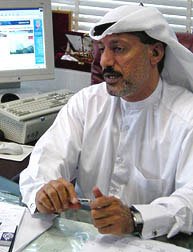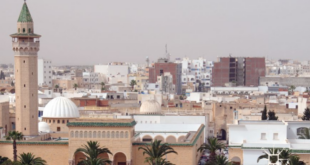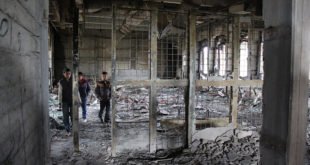TBS first spoke with Al-Jazeera Managing Director Mohammed Jasim Al-Ali in Cairo in June 2000 for an extensive interview about the channel, its startup, and its plans. With Al-Jazeera making news around the globe for its coverage of current world events, TBS Senior Editor S. Abdallah Schleifer and Managing Editor Sarah Sullivan visited the Al-Jazeera headquarters in Doha for an update.
TBS: In the last year and a half since we talked with you, Al-Jazeera took on a truly pan-Arab dimension with your coverage of the Al-Aqsa Intifada. What's your analysis of that coverage and how it impacted Al-Jazeera's image in the Arab world?
Mohammed Jasim Al-Ali: I think first of all we've made progress in the news field. When we started in 1996 it was unusual to have an independent news and current affairs channel in Arab countries, in Arabic. In 1998 when Desert Fox happened we covered it, because we were the only channel there in Baghdad for the first week. [ed—Mr. Al-Ali indicates the framed front page of the Times of London, dated Dec. 18, 1998, hanging on the wall of his office. The lead story includes a large color photograph of bombings in Baghdad; in the bottom right corner of the picture is the CNN logo, and under that, partially obscured but still clearly visible, is the Al-Jazeera logo.] This was a big milestone for Al-Jazeera, as was the Intifada. In each step, beginning in 1996, we've been under the test of the audience, of how much they will watch, can we build a bridge between ourselves and the audience, will they trust our news.
TBS: You mentioned to us earlier that there was a lot of skepticism in the beginning, that you opened not with great expectations, but instead listening to people saying no one in the Arab world will be interested.
Al-Ali: Because they don't trust the news in the Arab media, TV or newspapers. They didn't believe it would be an independent channel. So we were put to the test—how much we would be independent, how much we'd be free of government censors, are we a professional station or not. I think that from the first year we succeeded. In the beginning it was our plan to go to 24-hour transmission within five years. In three years we went to 24 hours. That means we have a very strong push from the audience; they want us 24 hours. We started in Europe and the Middle East, and were pushed by the audience to be all over the world; now we're globalized and can be viewed in America, Australia, everywhere.
So this next phase for Al-Jazeera, after Iraq and the Intifada, is our coverage of what's happening right now in Afghanistan. In each phase we've been criticized. In the beginning people said we're CIA or an Israeli channel, because we've brought Israeli journalists and experts to talk about the problem. We deal in a professional way, we get both opinions. In 1998 we covered Iraq, so we of course took Saddam Hussein's speeches, and were accused of being under Iraqi control. During the Intifada we were accused of supporting Hamas because we covered events and interviewed Hamas leaders.
TBS: This criticism has come from the Middle East—is this the first time that Washington has seriously and openly criticized you?
Al-Ali: Yes, and this time it's an official announcement through the White House that Al-Jazeera should be toned down. It's strange that this is coming from America, which supports freedom of speech and freedom of the media. If we weren't in Afghanistan, how would our news be balanced—we would cover only the US and Allied position, and cover Pakistan. But we also cover the other side, that of Afghanistan and Al-Qaeda. If we weren't in Afghanistan, we wouldn't have that.
I think the question right now is why the Americans are criticizing Al-Jazeera. Right now the media in American knows that in this event they aren't there, and I think it's coming out of jealousy. They know there's another war, the war of information. The information we obtain and put on air is the news. If the bin Laden tapes went to another network, they'd put them on air as soon as they received them.
TBS: After these statements out of Washington, comments that Al-Qaeda might be using these tapes to transmit messages, CNN and the other US networks broadcast an express policy that they will not run tapes live and will review them first and work with US authorities. Has Al-Jazeera formulated a specific policy, or have you changed your policy?
Al-Ali: No, we will not change our policy, but will continue the same way of working as a professional channel. When we get material, we view it and decide if it's suitable to air it. We've had a lot of statements come to Al-Jazeera that we think are not newsworthy, and we don't put them on the air. We try to present accurate and correct information, and find the right people to talk to us on air. We'll continue the same way. And in the United States, they may take the tape, view it, and put it on air anyway.
TBS: How do you handle that in terms of conscience? Say you receive a tape from Osama bin Laden. As a journalist you're professionally obligated to broadcast it, you owe it to journalism and to the audience. As a human being, you're afraid that this tape will be what pushes someone, listening to bin Laden saying go kill Americans, to take a gun and start shooting.
Al-Ali: We do worry about this. We worry about how we treat the news. We don't just take any tape that comes to our offices or to the station and put it on air. Before that we have a meeting to discuss how we should treat the news, and not be subject to the propaganda from a party or organization or group, Osama bin Laden or others. When we aired the tape of Osama bin Laden spokesman Suliman Abu Geith, directly after that we brought Edward Walker, former US Assistant Secretary of State for Near East Affairs, for his comments, and after that a Muslim cleric to talk from an Islamic perspective about Osama bin Laden's statements, to raise points such as that Islam doesn't allow you to kill innocent people, that bin Laden will condemn American bombings but at the same time give orders to kill innocent Americans. To air the statements without any comments, without any opposing statements or viewpoints or analysis, that's when it's propaganda.
TBS: How did you get into Afghanistan in the first place?
Al-Ali: When we started the channel we first concentrated on opening offices in Arab countries and Islamic countries. We started with Palestine and Iraq, because these were hot areas and there was news happening. So we opened an office in Jerusalem, with sub-offices in Gaza and Ramallah, and at the same time opened in Baghdad, then moved to the other Arab countries. When these were in place we moved to other Islamic countries, first Iran, and Pakistan, then we tried to get into Afghanistan. We got permission from the Taliban—and at the same time permission was granted to us, it was also granted to CNN, Reuters, and APTN. This was two years ago. We opened two offices, in Kabul and Kandahar. The others didn't move in, because they didn't consider it very important and didn't see much news coming out of there. But for us it was important, because it's an Islamic country.
TBS: And there was a civil war going on—which isn't very important to, for example, CNN because of their American orientation, but to the Muslim world that's very important.
Al-Ali: They're looking through international angles. The difference between CNN and Al-Jazeera is that they look first to international news, then maybe to Asian, Middle Eastern specific issues. We look first to Arab and Islamic issues in detail, and after that to international questions. When we opened the office there and invested in equipment for it—cameras, an SNG, edit suites, everything—some members of the board complained, asking why we were putting our money there. Sometimes we get exclusive footage, such as the bin Laden interview; during the Taliban destruction of the Buddha statues we used our SNG to serve others. But it's not a lot of news for the monthly amount we spend on people and equipment.
TBS: Did your special presence in Kabul and Kandahar in any way affect your coverage of the Northern Alliance and its resistence to the regime, prior to the current crisis?
Al-Ali: No, because at the same time we sent our reporters from their offices to cover other areas. They went with Ahmed Shah Masood and covered the north. Also, we planned to open an office in the north, but it's very, very difficult to get people in to those areas. But we were there, covering both sides, the north and the Taliban. When the crisis happened we wanted to be in all positions—we're in Afghanistan, in Pakistan, in Iran near the border with Afghanistan, and we want to be in the north. Our reporter went, and stayed in Dushanbe, Tajikistan for ten days waiting for permission to get into Northern Afghanistan. They weren't allowed to enter because of the assassination of Ahmed Shah Masood, because the assassins were Arabs. There are no Arab TV reporters in the north because of that. But at the same time, we bring the leaders of the North to participate in our programs—Dr. Abdallah Abdallah, the Uzbeki leader Abdel Rashid Dostam. On "Ittijah el Muakis" (The Opposite Direction) we had one guest from Kabul from the Taliban—Mohammed Yasser, the former minister of information, via satellite—and had the Northern Alliance ambassador to Kuwait, Nasir Ahmed Noor, in the studio. Both could speak in Arabic. We've brought many experts from the North, and are still trying to get our reporters into that area.
TBS: How did the new relationship you have with CNN come about?
Al-Ali: We've had a history of cooperation with CNN. Three or four months ago we had a meeting with them to agree on cooperation, so that in areas where they are strong we would join in, and in the places that we're strong they'd have our support. It became formal around two and a half months ago, and more so after Sept. 11. It's a long-term agreement, not just for this crisis.
TBS: While we've been in Doha we've seen other network executives around. Do you have agreements with anyone besides CNN?
Al-Ali:We have an exclusive contract with CNN, but at the same time we're serving others in all parts of the world. If Reuters or AP or ABC, for example, are in Kabul and Kandahar, we'll rent them equipment or sell them satellite time. Other stations, obviously, are buying our exclusive footage. But our relationship with CNN goes back a long way. Their reporter in Northern Afghanistan will only be seen on Al-Jazeera, and our people only on CNN. We've had other invitations for this type of cooperation but we've turned them down.
TBS: CNN since the early 1990s has debated within their own leadership the idea of doing an Arabic-language CNN. Do you think with these developments and their alliance with you that they won't move with that?
Al-Ali: I think this idea came about before Al-Jazeera, but after our launch I think they gave it up. They're cooperating with us, we signed a contract to work together. They're launching an Arabic language website, though, CNNArabic.com—I think there's space for that, just as we have our website, AlJazeera.net.
TBS: How many people did you bring in from BBC Arabic service when you started up?
Al-Ali: At that time the BBC Arabic TV service was being shut down, so there were lots of people available. We brought about seventeen or eighteen of them, in different fields, both editorial and technical. Right now we have only around ten; the others have moved on to other things.
TBS: When can you talk about your deal with CNBC to put together an Arabic-language business news channel?
Al-Ali: We haven't decided when it will be launched, because we haven't signed the last agreement. But we've signed a memo of understanding, about a month ago. Top CNBC executives came here to meet with us. The plan is for a channel starting with six hours of transmission which will gradually increase to 24 hours.
 Arab Media & Society The Arab Media Hub
Arab Media & Society The Arab Media Hub





